Poetry
Poetry

In Commemoration of the Visit
About her collaboration with Robert Glück, Kathleen Fraser writes:
"In Commemoration of the Visit of Foreign Commercial Representatives to Japan, 1947 is a small picture book assembled as a memento of Japan’s finest tourist sites, to be given to their new allies (and recent adversaries). I discovered the book when my friend Bob Glück sent me to an Asian antique store, where he thought I might find 'little things' for Christmas gifts. Seeing this book in the $1 box, I bought a copy and began to write a poem sequence based on each of the photos and their captions, not knowing that Bob had also bought this book and was writing his own version from the same collection of pictures."
Featuring color reproductions of the entire postcard book, In Commemoration of the Visit is an accidental collaboration–and we couldn’t be happier for the accident.
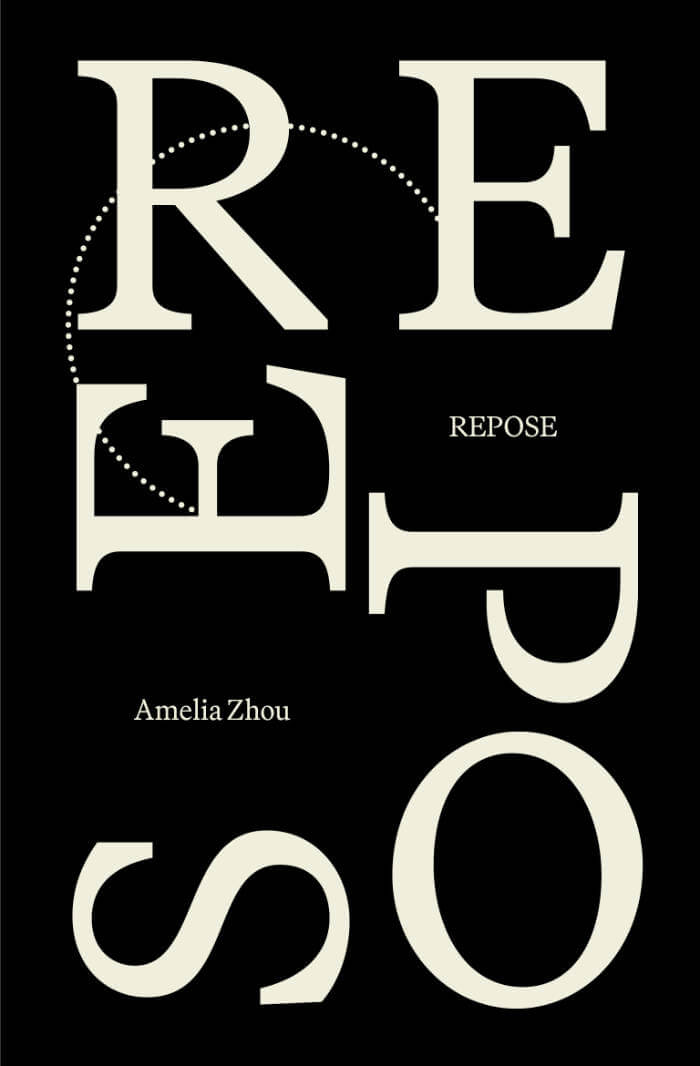
Repose
In her debut book, Amelia Zhou poses the question, “How do I perform or not perform?” Weaving together poems, fiction, and lyric essay, Repose follows an unnamed woman grappling with the limits of the self on the everyday stage of labor and routine, charting her emergent modes of resistance. She is already steps ahead, deftly shifting between worker and dancer, roving through the haunted space in which a performance has just ended, the ruins of a house, or a skyscraper aflame. Seeking the edges of form—where it exceeds itself, where it breaks down—Repose offers a narrative of girlhood invigorated by the mutual possibilities of dreaming and defiance.
Amelia Zhou's Repose is the 2022 Open Reading Period Book Prize winner, and was selected by guest judge Asiya Wadud.
About the author
Amelia Zhou was born and raised in Sydney, Australia, and currently lives in Cambridge, England. Her work as a writer is often interdisciplinary and hybrid in form and media, and has appeared most recently in Fence, Liminal, and Orleans House Gallery. She is pursuing a PhD in English at the University of Cambridge, where she is researching the role and politics of photography in largely anglophone life narratives from the 1970s to the present. She is also currently one of Sydney Review of Books' 2024–25 Emerging Critics Fellows. Repose is her first book.
Praise
Real estate agent, surgical patient, ballet dancer, baby raiser... In Amelia Zhou’s layered, lucid, and dream-suffused Repose, performing professionals remind us that the girl’s vocation remains the management of (her) appearances. As “second bodies,” these figures hover and break apart, like a “mouth now wandering away.” Following the paths of their roving weirdness, Zhou’s poetics alert us to some other more sublime task. “To bloom out the ragged bud.” To notice the “furious dignity” in all her/our many scraps and shreds. —Lauren Bakst
Amelia Zhou’s Repose is a work of measured reflection: it is also a work that is as full of movement and intelligence as the two mediums that Zhou invokes throughout the book, cinema and dance. —Aurelia Guo
Early on in Amelia Zhou’s Repose, the speaker asks the reader, “Do all lost things live in ruins?” Ruins—as in aftermath, as in refuse, as in the rotting and wilted physical landscape—permeate this deft and roving collection of poems. Zhou’s work rests in the fleeting space of bodies in motion, the friction of bodies troubling and inhabiting spaces across planes and distances. Zhou does not attempt to still this movement. Instead, she allows it to fold and create its own repetitions, logic, and accord. Along the way, Zhou opens up a space for the spectral. —Asiya Wadud

Language Arts
Justin Allen’s Language Arts takes up writing as an integral part of an interdisciplinary art practice. Across poems, essays, lyrics, screenwriting, and drawings, works touch on themes of music and subculture, African diasporic language, visual art, and more, bringing together Allen's numerous influences into one collection.
Justin Allen's Language Arts is the 2022 Open Reading Period Editors' Pick.
About the author
Justin Allen is a writer and performer from Northern Virginia. With a background in tap dancing and creative writing, his work often combines a variety of art forms. He has been commissioned by The Chocolate Factory Theater and The Shed and has held residencies at ISSUE Project Room and the Center for Afrofuturist Studies. He has received support from Franklin Furnace, Foundation for Contemporary Arts, and the Jerome Foundation, and shared his work both stateside and abroad.
"In Hatnaha, Justin Allen has reinvented the myth of Atlantis for our postlapsarian age. His art of language cannibalizes the American grammar book, spawning gorgeous new idiolects. Through the buzz and rumble of Afro-diasporic sound clash, Allen hears the frequency of bodies becoming ungovernable. Set to a soundtrack of punk phonotactics, Language Arts is just the book to toss over the barbed wire fences that cordon us off from our post-Reparations future." —Tavia Nyong’o
"Language Arts shares a name with an elementary school class I always wished was more “art” and less rote memorization, and it fully delivers on that desire with its spellbinding assortment of prose poetry, screamo lyricism, screenplay, conlang, and Black political fiction as vibrant as any comp on physical media or stream. nunats nen-tuk nutaks dipa. Justin Allen creates an executable file, one that's bound to spread like Soulja Boy's "Crank That" renamed “britney_spears-hitmebabyonemoretimeremix.mp3," but without the need for tricknology." —Devin Kenny

An Inherent Tear
Rodrigo Quijano’s An Inherent Tear assembles a suite of poems first published in Lima in 1998 as Una procesión entera va por dentro and his 2014 essay “A Terrace in Valparaiso,” translated into English for the first time by Judah Rubin. Written during the Fujimori years of the 1990s—a period characterized by the end of the conflict between the Maoist Sendero Luminoso insurgency, the Peruvian army, and the Marxist-Leninist Túpac Amaru Revolutionary Movement—Quijano’s bracingly mournful and incisively wry poems insist that we not turn away from the unburied dead. Shifting between neo-baroque hermeticism and a poetics of the conversational, his work destabilizes lyric subjectivity, testing the limits of the structure of metaphor to relay the impasses of the present. Reflecting almost twenty years later from the “city of wildfires,” Quijano’s essay charts the continued landscape of state violence that carries with it the “payroll of bones” Cesar Vallejo evoked nearly a century earlier. In this new, searing collection, Quijano searches amid the smoke and the ashes for “A place to spend the night, / or a language to speak in, / walking through the desert, or drilling into our / insubstantial dreams.”
About the author
Rodrigo Quijano is a poet and art researcher. He has worked on contemporary art exhibitions in Lima, São Paulo, Mexico, Buenos Aires, Santiago, Bogotá, and the 57th Venice Biennale.
About the translator
Judah Rubin is the author, most recently, of Antiquarian Historiography (Oxeye Press, 2020). Recent translations can be found in the anthology The Beauty Salons/Salones de la Belleza (Aeromoto/Gato Negro/UNAM, 2021), the journals Firmament and Jacket2, and elsewhere. He is the editor of A Perfect Vacuum and lives in Queens, New York.

Hechtmappen bieden geen soelaas
Hechtmappen bieden geen soelaas is wat overbleef na een vakantiejob waarbij de taakinhoud vooral bestond uit het verwijderen van nietjes uit verouderde documenten. Deze weken waren de bron voor fascinaties voor ongemakkelijke stiltes, gesprekken in liften, de diefstal van fluorescerende pennen en een ontplofte ventilator.

Apparitions: (Nines)
Injecting the disruptive potential of collective action into the body of the poem, Nat Raha's invigorating experiment resuscitates Anglophone poetry.
Amidst the violence of capitalism and state and imperial power, there is Nat Raha's apparitions (nines) in its "charred golden minidress," ushering us into a space of grief and resistance, the embodiment and intimacy of queer, trans, and diasporic Black and brown people. Written as a series of "niners," a poetic form consisting of nine nine-syllable lines, apparitions (nines) is at once a brash and subversive rejoinder to the Anglophone sonnet, as well as an ode to beauty, collectivity, and tenderness which emerges from—and far surpasses—constraint.
"These poems are eccentric in the most literal sense, Raha’s writing pushing at the edges of the mainstream of poetry, presenting a punk, transfeminist revision of poetic norms. . . apparitions (nines) deserves to be read—for its insights and newness, and the studs of pleasure it doles out." - Lou Selfridge, Frieze
“Welcome the poems that split us open, ‘frequencies/ to be removed from the air.’ Nat Raha has sharpened the lines, their serrated letters leaving us marked, poems to touch again on the skin, feel our doom undo its direction for enduring solidarity; the best love.” - CAConrad
Dr Nat Raha is a poet and activist-scholar whose previous books of poetry include of sirens, body & faultlines (2018), countersonnets (2013), and Octet (2010). Her work has appeared in 100 Queer Poems (2022), We Want It All: An Anthology of Radical Trans Poetics (Nightboat, 2020), Liberating the Canon: An Anthology of Innovative Literature (2018), on Poem-a-Day, and in South Atlantic Quarterly, TSQ: Transgender Studies Quarterly, Transgender Marxism,and Wasafiri Magazin. With Mijke Van der Drift, she co-edits the Radical Transfeminism zine and has co-authored articles for Social Text, The New Feminist Literary Studies, and the book Trans Femme Futures: Abolitionist Ethics for Transfeminist Worlds. Nat completed her PhD in queer Marxism at the University of Sussex, and is Lecturer in Fine Art Critical Studies at the Glasgow School of Art.

Glossolalia
Translated by Kristine Ong Muslim with an introduction by Amado Anthony G. Mendoza III.
Feverish from the engrossing revelatory arcs of the uncanny, Glossolalia is a mind-bending foray into the twisted underlying logic of material reality and a rip-roaring romp through Philippine urban legends, psychogeography, and the uncomfortable, often seedy aspects of music, cinema, and art. Marlon Hacla—who is a computer programmer as well as a poet and created the first robot poet in Filipino, Estela Vadal—is a significant innovator in the Philippine poetic tradition. As Amado Anthony G. Mendoza III notes in his introduction, Hacla “eschews the spare language, subtle imagery, and quietism featured in most contemporary Philippine poetry. Hacla’s poems, especially here in Glossolalia (and in its informal sequel Melismas), read like an unapologetic statement against the New Critical tradition that has been pushing its weight in the Philippine literary scene for more than half a century.” This collection of relentless, densely layered prose poems is the third of Hacla’s books to be translated into English by Kristine Ong Muslim.
Marlon Hacla is a poet and artist living in Quezon City, Philippines. His first poetry collection, May Mga Dumadaang Anghel sa Parang (Manila: National Commission for Culture and the Arts, 2010), was published as part of UBOD New Authors Series II. His second book, Glossolalia, was published by High Chair in 2013. Kristine Ong Muslim’s English translations of his books are Melismas (Oomph Press, 2020), There Are Angels Walking the Fields (Broken Sleep Books, 2021), and Glossolalia (Ugly Duckling Presse, 2023).

Mouth: Eats Color
Sagawa Chika Translations, Anti-Translations, & Originals
Ten poems by Sagawa Chika are conveyed into English and other languages through a variety of translation techniques and procedures, some of them producing multilingual poems. Languages used include English, Japanese, French, Spanish, Chinese.
"Mouth: Eats Color is a brilliant infra-textual work, brainchild of the bi-cultural poet/translator Sawako Nakayasu. The collection provokes, expands, and disavows the parameters of language and person and tradition, to forge a beautiful weave of performance and interrogation. This is a project of multilingual wit and passion, echo upon echo upon echo." — Anne Waldman
Sawako Nakayasu is an artist working with language, performance, and translation – separately and in various combinations. She has lived mostly in the US and Japan, briefly in France and China, and translates from Japanese. Her books include Some Girls Walk Into The Country They Are From (Wave Books), Pink Waves (forthcoming, Omnidawn), The Ants (Les Figues Press), Texture Notes (Letter Machine Editions), and the translation of The Collected Poems of Chika Sagawa (Penguin Random House), as well as Mouth: Eats Color – Sagawa Chika Translations, Anti-translations, & Originals (Rogue Factorial), a multilingual work of both original and translated poetry. She is co-editor, with Eric Selland, of an anthology of 20th Century Japanese Poetry (forthcoming, New Directions). She teaches at Brown University in the Department of Literary Arts.
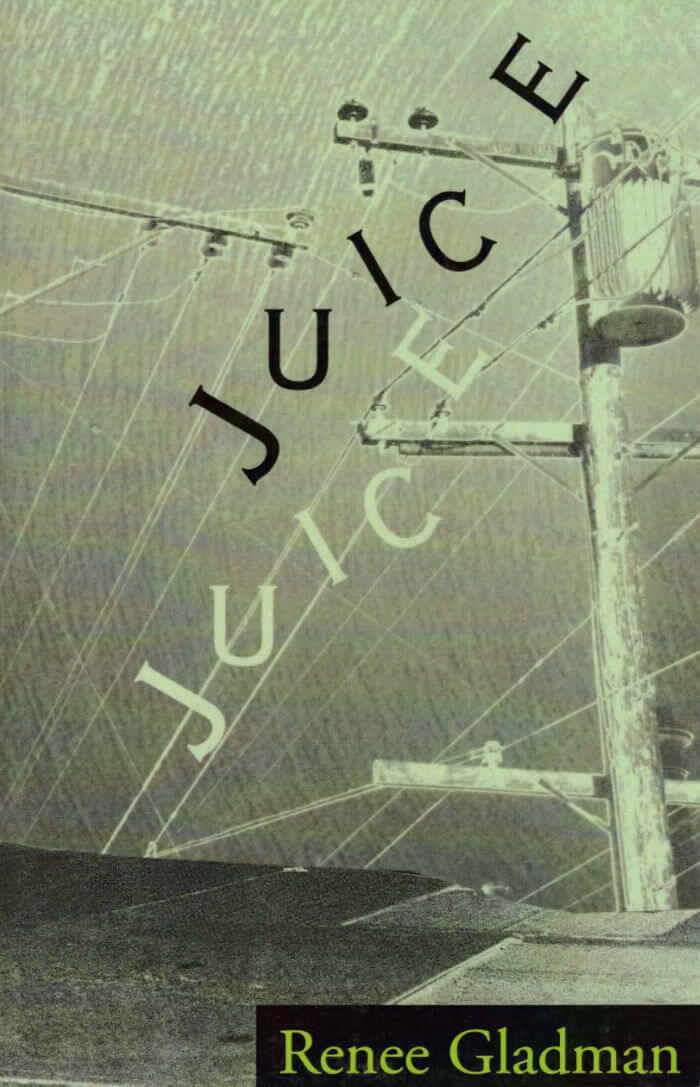
Juice
Juice is Renee Gladman's first full-length book. Gladman wields an idiosyncratic skill with description and characters that draw praise and attention from her contemporaries. Juice describes a world where seemingly minor obsessions and details (like the narrator's almost random preference for juice) can structure and develop an entire story, down to its tone and style. As her narrator puts it: "So far it has been sex and leaves that keep me alive."
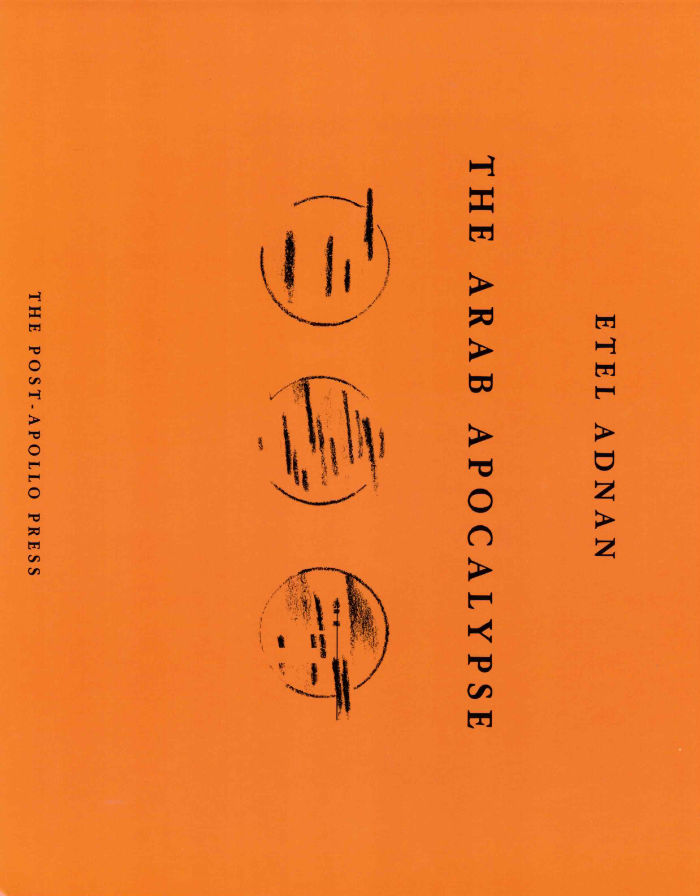
The Arab Apocalypse
Translated from the French by the author.
“From time to time, there occurs what suspends time, revelation—at least for certain people, martyrs. But then the apocalypse, revelation, is withdrawn, occulted by the ‘apocalypse,’ the surpassing disaster, so that symptomatically apocalypse’s primary sense (from Greek apokalypsis, from apokalyptein to uncover, from apo- + kalyptein to cover) is occulted by its secondary meaning, and martyr’s primary sense, witness, is occulted by its secondary, vulgar meaning: ‘a person who suffers greatly or is killed because of their political or religious beliefs’… While the Arab ‘apocalypse’ as surpassing disaster leads to a withdrawal of Arabic tradition, the apocalypse as revelation leads to Arabic tradition’s vertiginous extension.” — from the Foreword by Jalal Toufic
Etel Adnan was born in Beirut, Lebanon in 1925. She is a celebrated writer, essayist, and playwright, and is the author of more than twenty books in all these disciplines. Her work as a whole is a faithful record of the times and places she has lived in Beirut, Paris, and in the San Francisco Bay Area. At least eighteen works by Adnan have been published in English. They include Sitt Marie Rose (Post-Apollo Press, 1982); The Arab Apocalypse (Post-Apollo Press, 1989); Sea and Fog (Nightboat Books, 2012), winner of the Lambda Literary Award for Lesbian Poetry and the California Book Award for Poetry; Premonition (Kelsey Street Press, 2014); Surge (Nightboat Books, 2018); Time (Nightboat Books, 2019), winner of the Griffin Poetry Prize and the Best Translated Book Award; and Shifting the Silence (Nightboat Books, 2020). In 2021, Litmus Press published a second edition of Journey to Mount Tamalpais (originally published by The Post-Apollo Press), which included nine new ink drawings by Adnan. Her paintings, described by New York Times art critic Roberta Smith as "stubbornly radiant abstractions," have been widely exhibited. Spanning media and genres, Adnan's writings have led to numerous collaborations with artists and musicians, including the French part of CIVIL warS, a multi-language opera by American stage director Robert Wilson, performed in Lyon and Bobigny in 1985.

Incubation: a space for monsters
New edition of this long out of-print classic of diasporic literature, featuring a forward by Eunsong Kim, an afterword by Emgee Dufresne, and new endnotes by Bhanu Kapil.
Incubation: a space for monsters is a formally innovative, hybrid-genre book that incorporates poetry and prose. Set in a shifting narrative environment, where human bodies, characters, and text are neither one thing nor another, this fragmentary-diaristic text journeys through the spaces in-between. Originally published in America in 2006 by Leon Works, and out of print for the last seven years, this is the first time this seminal text has been available in the UK.
Following protagonist Laloo – Cyborg, girl, mother, child, immigrant, settler – on a roadtrip through American landscapes, genre styles, and form, Incubation creates radical space for what is ‘monstrous’. Appropriating iconic American tropes, and the structure of Jack Kerouac’s On the Road, Incubation explores the challenges faced by immigrants in attaining such notions of freedom in so hostile an environment. In this fragmentary document there is a celebration in the cobbling together of lives; global in scope, with an intimate focus on interior voice, this landmark text evidences the early innovations and talents of this T.S. Eliot prizewinning author.

Logorrhea
The fruit of a long-term project, this artist's book focuses on the written word and language in Jean-Michel Wicker's work.
Since the 1990s, the work of French artist Jean-Michel Wicker (born 1970 in Riedisheim, lives and works in Berlin) has focused on all forms of production, including publishing, typography, performance, and gardening. Wicker is the founder of the publishing houses Le edizioni della luna, Nice, Le edizioni della china, Berlin, and Ballabella papers, Berlin. His recent solo exhibitions include Edouard Montassut, Paris (2017), Bergen Kunsthall (2015), Sandy Brown, Berlin (2015), Künstlerhaus, Stuttgart (2015), Cubitt, London (2014), New Theater, Berlin (2014), Artists Space, New York (2013), Kunsthalle Bern (2012), and KW Institute for Contemporary Art, Berlin (2010). He has also exhibited in group shows, including the Institute of Contemporary Arts, London (2014), Kunsthal Charlottenborg, Copenhagen (2011), and Kunsthalle Zürich (2011).
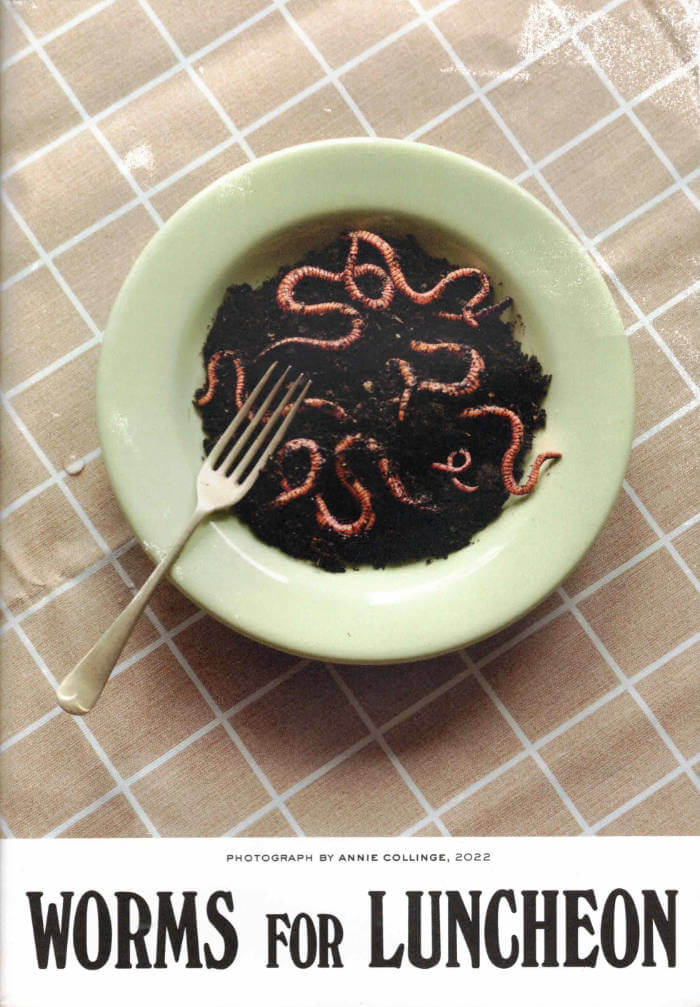
Worms For Luncheon
Worms and Luncheon have come together to bring the tastiest of fertilisers, to accompany your lunch for one. Think of this publication as a wine pairing for bookworms. Each story has been tailored to your taste, with a serving suggestion accompanying each piece. Not to be read in the company of others, and only to be consumed with food.
Featuring contributions from Eileen Myles, Cecilia Pavón, Clem MacLeod, Kate Morgan, Pierce Eldridge, Juliet Jacques, Lynne Tillman, Estelle Hoy, Jodie Hill, Leone Ross, Slutty Cheff, Izdihar Afyouni, Gabriela Aquije and Stephanie LaCava. With photographs by Chieska Fortune Smith.
The 88 page thread bound publication consists of poetry, short stories, personal essays, illustrations and photographs of the cosiest spots to dine alone in.
Concept initiated by Clem MacLeod and France Armstrong Jones
Writing Commissioned by Clem MacLeod
Editors Clem MacLeod, Caitlin McLoughlin, Pierce Eldridge, Arcadia Molinas and Violet Conroy
Cover image by Annie Collinge
Art direction and design by Caitlin McLoughlin and Mariana Sameiro
Illustrations by Clemmie Bache

DMZ Colony
Woven from poems, prose, photographs, and drawings, Don Mee Choi's DMZ Colony is a tour de force of personal and political reckoning set over eight acts. Evincing the power of translation as a poetic device to navigate historical and linguistic borders, it explores Edward Said's notion of "the intertwined and overlapping histories" in regards to South Korea and the United States through innovative deployments of voice, story, and poetics. Like its sister book, Hardly War, it holds history accountable, its very presence a resistance to empire and a hope in humankind.

Nox
Nox is an epitaph in the form of a book, a facsimile of a handmade book Anne Carson wrote and created after the death of her brother. The poem describes coming to terms with his loss through the lens of her translation of “Poem 101” by Catallus “for his brother who died in the Troad.” Nox is a work of poetry, but arrives as a fascinating and unique physical object. Carson pasted old letters, family photos, collages and sketches on pages. The poems, typed on a computer, were added to this illustrated “book” creating a visual and reading experience so amazing as to open up our concept of poetry.

Flower Engine
the second poetry collection from Natalie Briggs titled ‘FLOWER ENGINE’. This collection of cinched, bright free-verse explores the passing locations of love and the slow, private operations of pain’s knocking counterweight. The book extends Briggs’ relay of concise universal suggestions, translating them through brief, intimate utility.
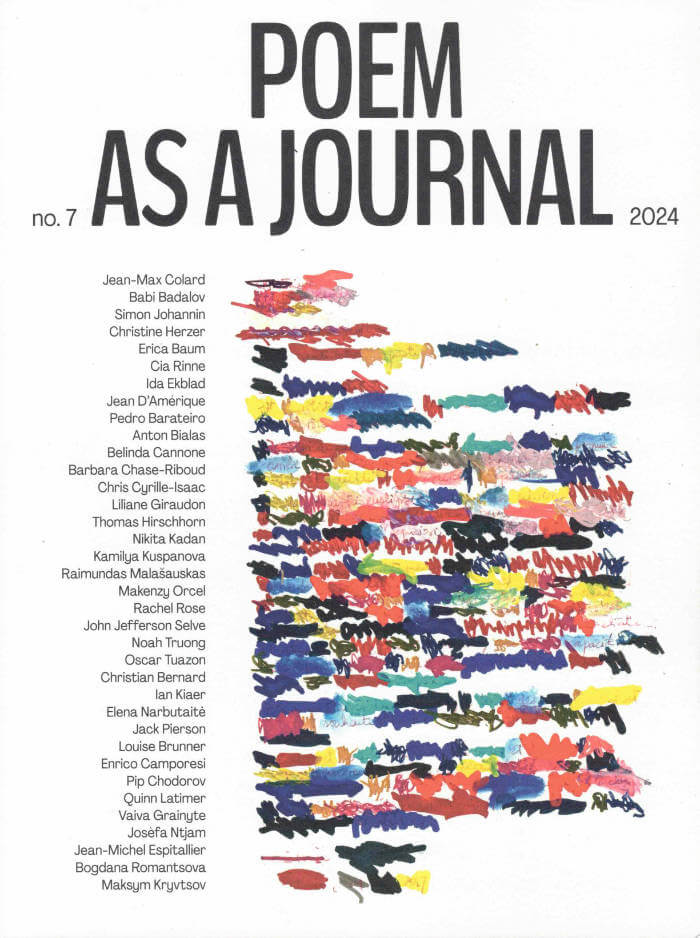
Issue 7: Poem as a Journal
What sparked off this issue of as a Journal was the clear evidence of poetry’s growing presence in the field of contemporary art. Rather than ‘Poetry’ in general, and even less so the figure of the ‘Poet’, it’s the poem that has our full attention: I find it in the title of an exhibition by Jason Dodge, on the invitation card sent out by artist Ida Ekblad, and then again in the form of an exhibition, in the display and arrangement of works within a space by Ian Kiaer, Elena Narbutaitė or Wolfgang Tillmans. Hence this open-ended question, ‘What is poetry for you today?’, placed like a probe among various art world players, in a sort of vox populi.
And so rises the confirmation of an intuition: in an art field driven by the market, where artworks are becoming luxury accessories for the jet set, poetry, with its poverty and economy of means, appears at the opposite end of the spectrum, as a pole of resistance.
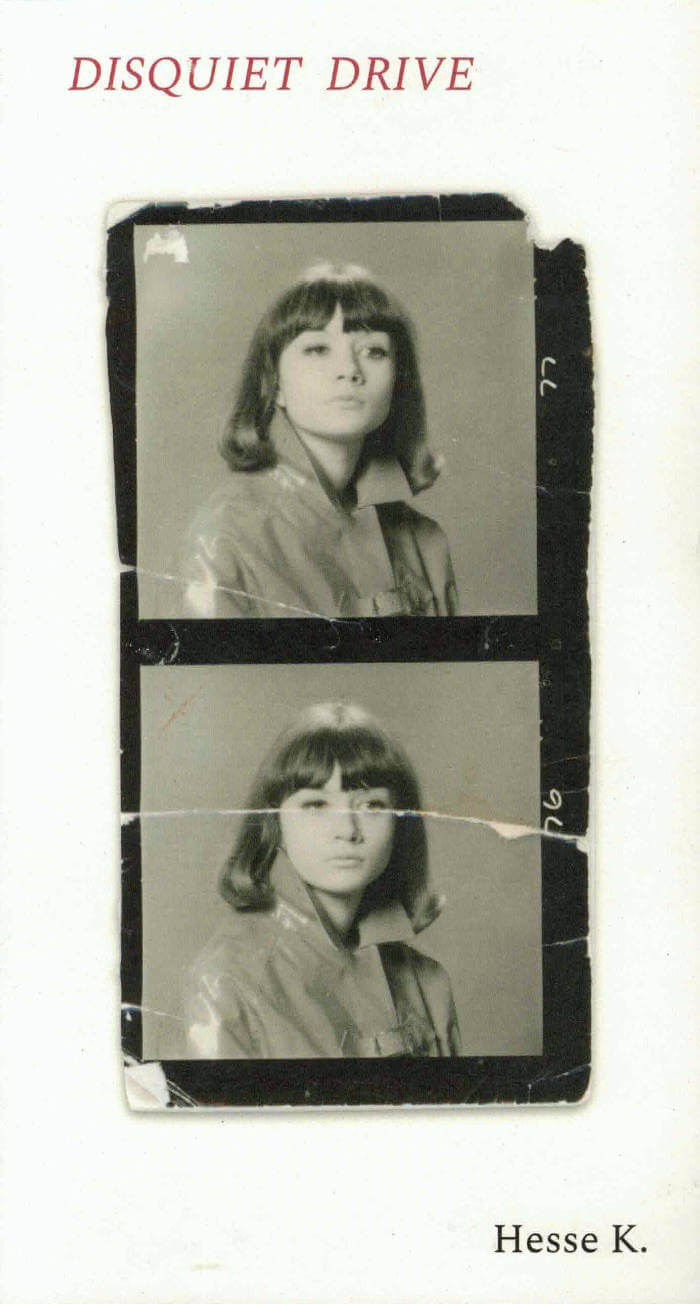
Disquiet Drive
One night a satellite falls out of the sky and splits a girl in half. Disquiet Drive is a book scraped together from the shorn parts of a person who may no longer exist. Beginning with an admission that language and embodiment seem indistinguishable, yet refusing to claim a singular voice, the texts in this collection lurch between the fiery crucible of a transition and the weird jaggedness of our own continuity; between inverted memoir and prose-poetry; the raw, irrepressible lyric and the essay as an exercise in the art of digging-one’s-heels-in. Disquiet Drive is about undoing the words we’re handed so that language can survive, and undoing the body so that it can find a way to live.
'Disquiet Drive is restlessly exquisite. Hesse K’s writing vibrates with the quiet solar intensity of a planetary body that can’t be looked at directly: things slip, slink, snick and lick into each other, limning a gorgeous periphery where genre, past and future selves, follies, fossils and hormones collide. I can’t remember when I last read something as exhilarating, beautiful and deeply attuned to the implications and contradictions involved in struggling towards a bearable world, and the ‘undomesticated sensibility’ it requires of us.' — Daisy Lafarge, author of Lovebug
'Buck wild and entirely unique, Disquiet Drive took me to the beautiful and chaotic edge of the universe and made me want to write (live) for 200 years.' — Eliot Duncan, author of Ponyboy
Hesse K. is a writer. Her criticism and poetry has appeared in MAP magazine and Montez Radio, and in anthologies by Sticky Fingers Publishing, Toothgrinder, Worms and Pilot Press, among others. She lives in London.

Bonbons à l'anis
Un fabuleux recueil – le premier publié en français – de poèmes et récits de l'autrice argentine Cecilia Pavón, préfacé par Chris Kraus (écrivaine dont Pavón a par ailleurs traduit des livres en espagnol).
« Cette traduction n'aurait pu voir le jour si je n'avais pas développé pendant quelques temps une obsession quasi malsaine pour l'Argentine. Cherchant à Buenos Aires les traces de lieux proches de Shanaynay que j'avais co-dirigé à Paris, je découvris au hasard sur internet l'existence d'un espace nommé Belleza y Felicidad et dirigé par Fernanda Laguna et Cecilia Pavón. Bien avant l'émergence de l'artist-run space en Europe, les deux femmes créèrent un lieu associant art et littérature. Lors d'un voyage à Buenos Aires, j'eus l'opportunité de rencontrer Cecilia Pavón qui lors d'une conversation sur l'écriture et la poésie, me proposa de traduire Licorice Candies en français. Sa poésie fut autant révélatrice qu'émancipatrice, à la fois par sa singularité et sa simplicité. Elle écrit ce qu'elle voit et ce qu'elle vit. Elle parle de certains quartiers de Buenos Aires, de ses amis, d'elle, d'un vélo qu'elle a perdu, de Timo. Il me semble qu'elle écrit comme elle parle d'amour, d'erreurs et de sexe ». Marion Vasseur Raluy, traductrice
The first collection of texts published in French by the Argentinian artist and poet.
Preface by Chris Kraus.
Translated from the English and Spanish by Marion Vasseur Raluy, Rosanna Puyol Boralevi and Mona Varichon.

Love Poems
Three long poems by American writer, artist and actor Rene Ricard (1946-2014), an icon of the New York underground in the 1970s, accompanied by a series of drawings by American painter Robert Hawkins.
After Rene Ricard 1979–1980 and God with Revolver, Editions Lutanie publishes a third collection of poetry by the American writer, artist, and actor Rene Ricard (1946–2014), Love Poems.
Reprising the rare, eponymous book published by Richard Hell through CUZ Editions in 1999, Love Poems features three poems by Ricard and a series of black-and-white drawings by Robert Hawkins). Haunted by death, betrayal, and guilt, Ricard's poems speak from a wounded heart. Hawkins's accompanying drawings have the simplicity of children's book illustrations, but feature menacing shadows, broken cigarettes, used condoms, and petal-less flowers.
Translated into French by Manon Lutanie and Rachel Valinsky, and presented in a bilingual edition, the poems are followed by a newly commissioned afterword by Hawkins retracing his encounter, friendship, and collaboration with Ricard.
With Love Poems, Editions Lutanie reaffirms its decade-long commitment—initiated the year of Ricard's passing—to reissue his out-of-print works for English-speaking readers, while also presenting them for the first time to a French-speaking audience.
"With three simple poems, Rene Ricard exposes us to the often strained love within class stratification, between those coming together from different worlds, whether Bowery panhandlers or street hustlers, Hollywood movie stars or the highest echelon of European aristocratic wealth. Rene Ricard writes poems that are always honest. Sometimes painfully so."
—Patrick Fox
Robert Hawkins (born 1951 in Sunnyvale, California) is an American artist who lives and works in London. A fabled figure of the 1980s and early 1990s East Village art and punk scene, his work is and has been collected by artists and writers including Jean-Michel Basquiat, Glenn O'Brien, and Jim Jarmusch. Among Hawkins' first exhibitions was Lower Manhattan Drawing Show, a group exhibition curated by Keith Haring at 77 White Street Gallery above the Mudd Club, in 1981.
Rene Ricard was an American writer, artist, and actor. He was born in 1946 and grew up in New Bedford, Massachusetts. After a troubled childhood, he fled to Boston as a teenager, where he came into contact with literary and artistic circles. At the age of eighteen, he moved to New York City and became a central figure in the city's artistic and literary scene. Ricard appeared in several films by Andy Warhol and continued to act in many independent films throughout his life. In the 1980s, he wrote two major collections of poetry, as well as important essays and articles, some of which were instrumental in launching the careers of artists such as Julian Schnabel and Jean-Michel Basquiat (about whom he wrote the famous article "The Radiant Child" in Artforum in 1981). Beginning in the 1990s, he developed a pictorial body of work and exhibited his paintings in various galleries in the UK and the US. He died in New York in 2014.
Edited by Manon Lutanie .
Translated from the English (American) by Manon Lutanie and Rachel Valinsky.
Drawings and afterword by Robert Hawkins.
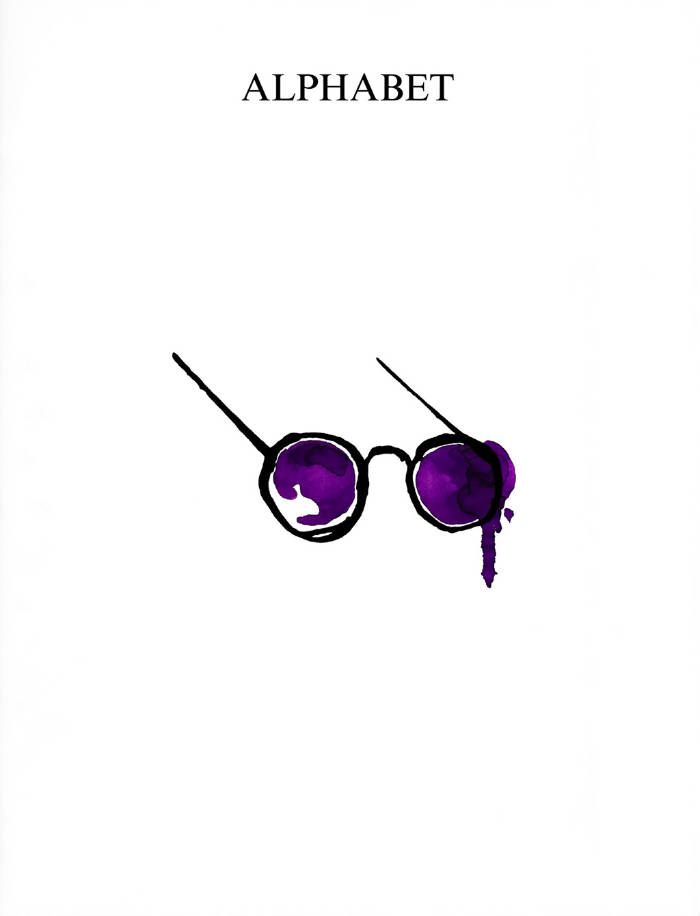
Alphabet Magazine #01
The first issue of the magazine made by artists, founded by Donatien Grau and Thomas Lenthal. Contributions by Mathias Augustyniak, Naomi Campbell, Théo Casciani, Michael Chow, Pan Daijing, Es Devlin, Claire Fontaine, Edwin Frank, Theaster Gates, Nicolas Godin, Alejandro Jodorowsky, Hedi El Kholti, Michèle Lamy, Paul McCarthy, Ian McEwan, Eileen Myles, Marc Newson, Hans Ulrich Obrist, Diana Widmaier Picasso, Ariana Reines, Barbara Chase-Riboud, Julian Schnabel & Jason Momoa, Hanna Schygulla, Juergen Teller, Iké Udé, McKenzie Wark, Robert Wilson, Yohji Yamamoto.
Alphabet is the artists' magazine. Here, they run the show. They write, they make images, they select their own works, they interview the figures they admire, they tell us what we did not know about them nor could have ever fathomed about life. This magazine is conceived entirely to put them in the driver's seat, and to enable readers to become part of the unique vision of some of today's greatest luminaries.
It is a manifestation of the creative community, coming together from all fields, from all generations and threads of culture. Writers, musicians, designers, painters, sculptors, poets—artistic figures of every kind converse all the time in their lives, but they did not have a shared space for their editorial projects. This is it.
Everyone who finds their way into Alphabet has made a mark on life, art, and culture, in a way that signals their importance to the present. Some of the contributors may be world famous, others well respected, others on the way to becoming the legends they already are. Their relevance to culture is the same, and that is why they all belong here, in the endeavor of the creative community. There is no hierarchy of status, or domain, or apparent impact. Some of the greatest revolutions happen undercover. Some of the most established voices are still breaking ground. The magazine's premise is simple: the old opposition between pop and underground does not make sense anymore. There are many creative communities, each following its own rules, each inventing its own space. Here, wherever they come from, whatever their community, artists can exist together, with the same intention of changing, and improving, what life is; with the same belief that art matters more than anything else.
None of the contributors is here randomly. They keep life thrilling and exhilarating, challenge the perception of everything and anything. Their role in shaping every aspect of life can hardly be overstated. That is why they needed a place to elaborate their own alphabet, their way of ordering and structuring language, the world, and the fabric of life—a place of freedom, where everything would be done to highlight their visions, where the very design would be a shrine to their magic. Even the distribution of the magazine was conceived with artists—each contributor suggesting sites of their liking.
Alphabet is also the magazine of magazines. Here, readers find essays, fictions, poetry, visual projects, DIY methods, recommendations from those who know, even games and astrology—and an artist's alphabet, articulating an entire universe. Anything that has ever formed a section of a magazine could find its way here. Even the cover is conceived by an artist: it was conceived especially by the legendary Robert Wilson. Artists will rejuvenate what magazines are, and magazines will be kept forever young by and with them.
Founded by Donatien Grau and Thomas Lenthal, Alphabet is a bi-yearly art magazine. Not a magazine about art. It's a magazine made by artists. Each contribution like an œuvre, making it the ultimate collector piece. Each cover is designed, with the word Alphabet, by a different artist, initiating a cult series.

Metal Works
A complete survey of the cast, forged, and fabricated metal sculptures made by Danish artist Sidsel Meineche Hansen since 2017.
The artist's practice addresses the industrial complex of virtual and robotic bodies and their relationship to labor in tech, pornography and gaming. While some sculptures were conceived as individual pieces, others were created with digital counterparts within installations that typically include CGI animation, documentary video, drawing and prints.
By presenting the metal works as stand-alone pieces, this book adheres to Meineche Hansen's concern with the material means of production, highlighting their concrete yet elusive nature. Several pieces in the publication are accompanied by poems written by artist Diego Marcon in response to the works. As an artist's project and an archival document, the publication echoes the tradition of documentary photography devoted to sculpture.
Sidsel Meineche Hansen (born 1981 in Denmark, lives and works in London) is a Danish artist. She produces exhibitions, interdisciplinary seminars and publications that foreground the body and its industrial complex, in what she refers to as a "techno-somatic variant of institutional critique". Meineche Hansen questions the body in the field of industrial representations: robotic or virtual bodies, and their relationship with the working world of industries of gaming, pornography, and new technologies. Her research-led practice has taken the form of woodcut prints, sculptures and CGI animations, often made by combining her own low-tech manual craft with outsourced, skilled digital labour.
Edited by Fredi Fischli and Niels Olsen.
Poems by Diego Marcon.

Wave of Blood
Is it the computerization of the planet
Or a loosening of my fidelity to suffering
I don’t understand the intensity
I’ve hidden here but I know I despaired
Of finding a physical place to keep
My tears. Now what. Seas that go turquoise
When you stop looking at them . . .
Wrestling with the mind of war, at times shocking in its self-analysis, Wave of Blood is a furious and sincere essay, an eclipse notebook, a family chronicle, all told in the poetry of witness.
Praise for Ariana Reines:
Ariana Reines is a go-for-broke artist who honors her traditions by being like no one else. Some of us have made a fetish of our stupidity, pretending to forget history, and some of us have made a fetish of despair, congratulating ourselves on melancholia, but Ariana is too brilliant and too alive for either of those sad luxuries... I am convinced of the authenticity of the summonses she receives and the summonses she issues and when I read her I am reminded that all of this is a calling before it's an identity or career. Her voice-which is always more than hers alone is a dialectic between the very ancient and the bleeding edge. - Ben Lerner
Reines's books are works of intellectual commitment and structural sophistication; at the same time, they allow the raw stuff of being, in all its messiness, to enter the page. -The White Review
Mind-blowing. - Kim Gordon
Her writing is queer and raunchy, raw and occult, seemingly never pulling away from her deepest vulnerabilities. Yet Reines simultaneously maintains a feeling of epic poetry, of ancient intention. She moves between worlds in search of the divine and the self. - The New York Times
These are the kinds of poems that reorient you in the world, make you understand how little you know, but how much is inside you. - NYLON

The North Road Songbook
The North Road Songbook collects together eight sequences of poems, most of which were composed between 2019 and 2024. The title sequence is a set of lyrics written around North Road in Brighton, originally a mediaeval field boundary, now a chaotic thoroughfare filled with ghosts, sirens and songs.
Verity Spott is a poet, teacher and care worker from Brighton, England, whose books include Hopelessness (the 87press), Poems of Sappho (in translation) and Prayers Manifestos Bravery (Pilot Press). Verity’s poetry has appeared in The New York Times and has been translated into French, German and Greek.
Paperback
252pp
ISBN: 9781739364977